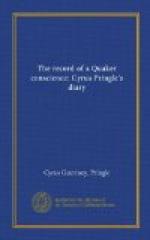But at the same time the most precious thing in the universe is that mysterious thing we call individual liberty and which even God himself guards and respects. Up to some point, difficult certainly to delimit, a man must be captain of his soul. He cannot be a person if he does not have a sphere of power over his own act. To treat him as a puppet of external forces, or a mere cog in a vast social mechanism, is to wipe out the unique distinction between person and thing. Somewhere the free spirit must take its stand and claim its God-given distinction. If life is to be at all worth while there must be some boundary within which the soul holds its own august and ultimate tribunal. That Sanctuary domain within the soul the Quakers, ever since their origin in the period of the English Commonwealth, have always guarded as the most sacred possession a man can have.
No grave difficulty, at least in the modern world, is involved in this faith, until it suddenly comes into conflict with the urgent requirements of social efficiency. When the social group is fused with emotion and moves almost as an undivided unit toward some end, then the claim of a right, on the ground of conscience, for the individual to deviate from the group and to pursue another or an opposite course appears serious if not positively insufferable. The abstract principle of individual liberty all modern persons grant; the strain comes when some one proposes to insist upon a concrete instance of it which involves implications that may endanger the ends which the intensified group is pursuing. A situation of this type confronts the Quakers whenever their country engages in war, since as a people they feel that they cannot fight or take any part in military operations.
They do not find it an easy thing to give a completely rational ground for their opposition to war. Nor, as a matter of fact, is it any more easy for the militarist to rationalize his method of solving world difficulties. Both are evidently actuated by instinctive forces which lie far beneath the level of pure reason.
The roots of the Quakers’ opposition to war go deep down into the soil of the past. They are the outgrowth and culmination of a long spiritual movement. They carry along, in their ideas, emotions, habits and attitudes, tendencies which have been unconsciously sucked in with their mother’s milk, and which, therefore, cannot be held up and analysed. The mystics, the humanists, the anabaptists, the spiritual reformers, are forerunners of the Quaker. They are a necessary part of his pedigree,—and they were all profoundly opposed to war. This attitude has become an integral part of the vital stock of truth by which the Quaker lives his spiritual life, and to violate it is for him to stop living “the way of truth,” as the early Quakers quaintly called their religious faith.




